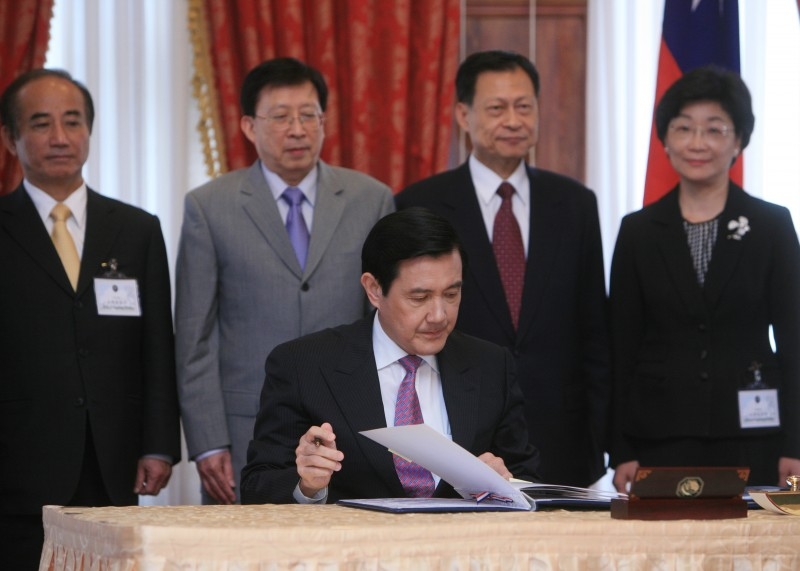News & activities
 News releases
News releases
President Ma Ying-jeou formally signed the instruments of ratification of two covenants on human rights – the International Covenant on Civil and Political Rights and the International Covenant on Economic, Social and Cultural Rights – on the morning of May 14.
The president, on behalf of the nation, ratified English and Chinese language versions of the covenants at the Taipei Guest House. The ceremony was witnessed by the Premier, the President of the Legislative Yuan, the President of the Judicial Yuan, the Minister of Foreign Affairs and the Minister of Justice. Also present at the event were ambassadors and representatives to the ROC, as well as representatives from human rights organizations. The endorsement of the treaties will be deposited with the United Nations (UN).
President Ma delivered remarks after the signing ceremony. He said that ratifying these two international covenants enriches Taiwan's democracy and also marks an important milestone in the development of human rights in Taiwan.
The president said that the reason that guests were invited to join in the signing ceremony is that since his inauguration last year, he has consistently expressed his vision of creating a world-class environment for human rights in Taiwan. President Ma commented that he hopes Taiwan is not only among the world's leaders in science, technology, economics and culture, but also is in step with international human rights standards. The president remarked that, in layman's terms, today's signing of the covenants marks the coming of age for Taiwan in terms of human rights, and that Taiwan will become an equal of other countries throughout the world in human rights. He said he is delighted to be able to complete the ratification of these covenants on the eve of his one-year anniversary of becoming president. This enables the people of the nation to understand that human rights are more than a slogan and the nation is resolute in taking concrete action. This also declares to the world that the protection of human rights in Taiwan is in step with international norms.
President Ma expressed his appreciation to Legislative Yuan President Wang Jin-pyng, noting that Speaker Wang's leadership was crucial in the legislature's ratification on March 31 of this year of the two human rights covenants. The Legislative Yuan soon thereafter also passed a statute governing implementation of the two covenants. The president also extended his gratitude to legislators from the ruling and opposition parties for their many years of efforts in this regard, to former Minister of Foreign Affairs Tien Hung-mao, who originally submitted the ratification proposal to the cabinet, and to former Premier Chang Chun-hsiung for his support. The president also welcomed the delegates of the human rights organizations, including the Red Cross and the Taiwan Branch of Amnesty International, that were in attendance at today's ceremony.
President Ma stressed that the ratification of the two covenants demonstrates a major step forward for Taiwan in human rights and also raises the bar for human rights standards here. He said that according to the normal procedures, the ratification of a covenant becomes effective three months after the instrument of ratification has been deposited with the UN. The president acknowledged that depositing the instrument with the UN may not be easy in this case. However, the Ministry of Justice has specially drafted a statute governing implementation of the two human rights covenants and the president said he signed this legislation on April 16, after which it was promulgated on April 22 and took effect on April 24. Therefore, the content of the covenants has already been incorporated into ROC law and can be acted upon. This is an extremely important point, he said.
The president also noted that the 84 articles in the two international human rights covenants have already become a part of the lives of the people of the ROC. The Legislative Yuan has made a pioneering effort from a technical perspective in the course of enacting these two covenants into domestic law, he said. As such, the president thanked the Legislative Yuan for its full support. He noted that the mechanism developed in the handling of these two covenants can be applied in the future to other international covenants.
President Ma indicated that the significance of the two covenants is not only the convenants themselves. Even more important, he said, is that the Ministry of Justice is taking responsibility for carrying out a sweeping review of existing laws and regulations over the coming two years in order to determine whether any run counter to the spirit of the two covenants. The president said he hopes this review will be completed by International Human Rights Day on December 10 and that laws and regulations requiring amendment be revised as soon as possible.
The president said that Liu Kai, the ROC's Ambassador to the UN in 1967, signed the two human rights covenants on behalf of the nation. However, the ROC withdrew from the UN in 1971 and the review of the covenants had been shelved since. It has taken 42 years for these two covenants to finally be ratified here, the president said. While the president said he was saddened that it has taken so long for the covenants to be ratified, at least we have now done it. We have shown the political will to sign and implement the covenants. This indicates that we have confidence in ourselves, he said. Taiwan can do it. "Yes, we can!" This is an extremely important step forward, President Ma said. He expressed his hopes that Taiwan's protection of human rights will be on the same level as that of the rest of the world. This will let countries know that the existence of Taiwan and the development of the ROC is in everyone's best interests, he said.



